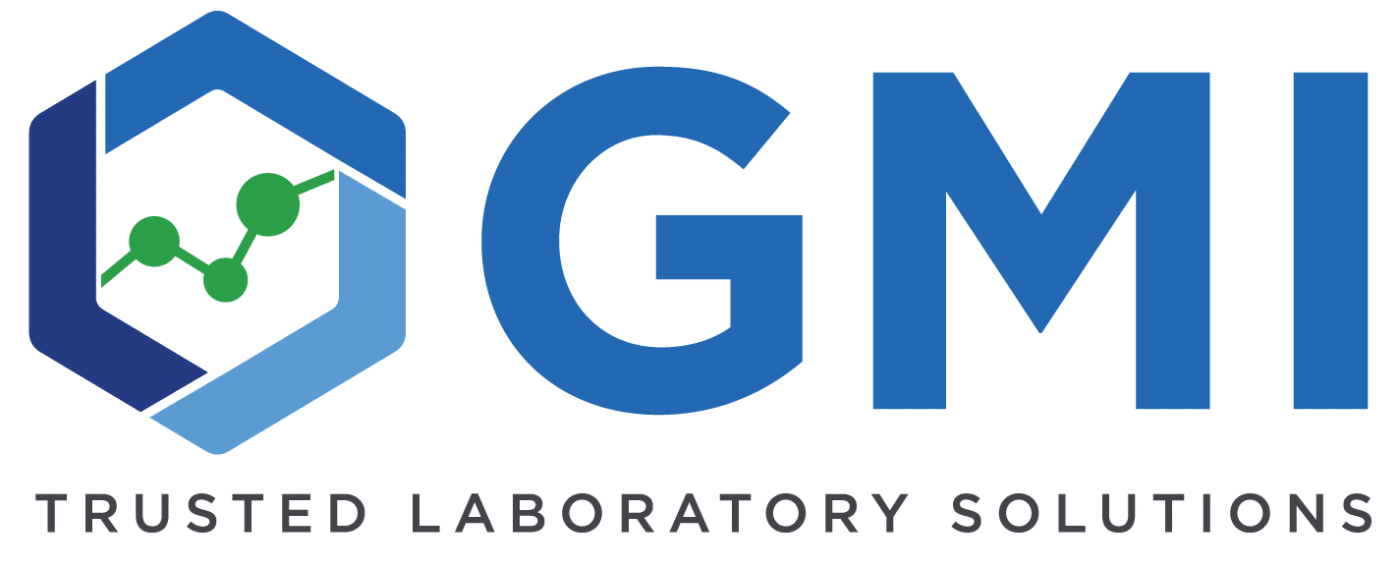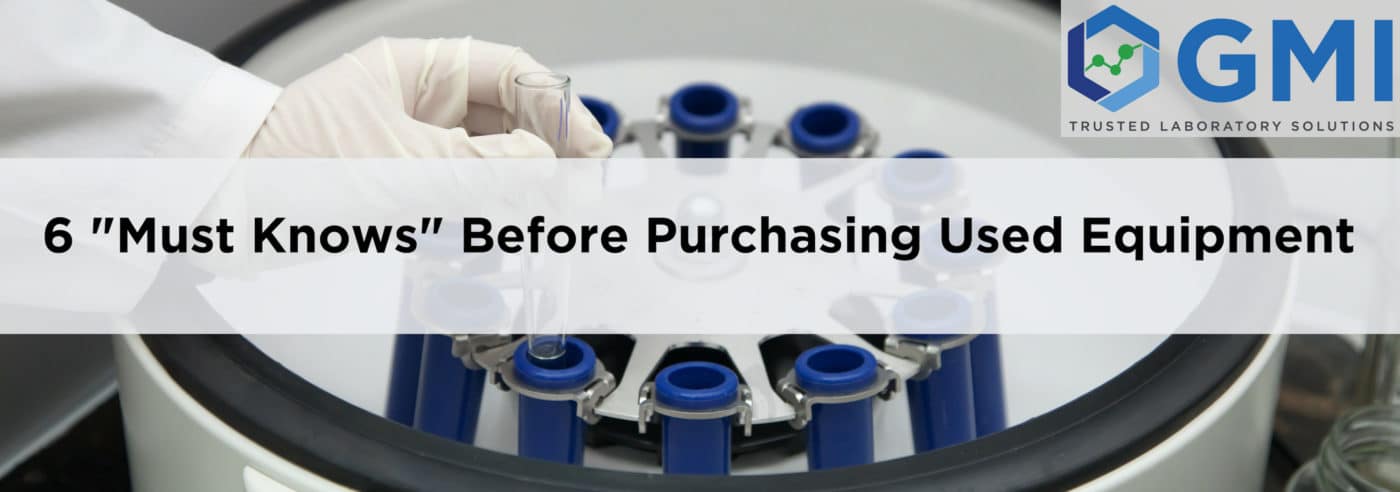No products in the cart.
Re-Certified Laboratory Instrumentation
6 “Must Knows” Before Purchasing Used Equipment
A large chunk of a laboratory’s funding is undeniably allocated on lab instruments. Because of this, more and more scientific and medical organizations are coming up with resourceful ways on how to save money when it comes to purchasing these. A very popular option nowadays is buying used lab equipment that helps facilities save on upgrades as well as 70 percent of its budget. As Original Equipment Manufacturers (OEMs) have tight schedules when it comes to supplying new laboratory instruments, the quick availability of used equipment is ideal for anyone who has an urgent need for a unit — whether as a replacement for a one or just to meet market demands. But before taking that big leap and making any major purchasing decisions, it is important to know what and who you are exactly dealing with. With a lot of choices available in the market and used lab equipment resellers online, you must learn how to scrutinize the reputability of each option. It is crucial to be aware of the potential pitfalls when buying second-hand equipment as doing so can balance costs against risks and help you reap real financial benefits. Get a high return on your investments by following these tips on scoring quality refurbished laboratory equipment below:
1. Evaluate Demands of Application Areas
Before choosing your used lab equipment, it is imperative to review the demands and needs of your applications. With the variety of each type of lab instruments available, you should at least have an idea on the specific options you need for your application. If you are looking for a centrifuge, check if your experiments require a high speed one, a unit with a large capacity, a microcentrifuge or a powerful benchtop model. If you are doing research involving liquid chromatography, you should consider the samples you will be separating and quantifying as these would determine if you need a Fast Protein Liquid Chromatography (FPLC) system instead of a High-Performance Liquid Chromatography (HPLC) one and which type of detector you require.
2. Research and choose a trusted supplier
A critical factor to consider when buying used lab equipment is researching and selecting the right supplier. Visit supplier and distributor websites for relevant information such as a company’s history, reviews, and contact details. Be wary of online resellers that may just be listing thousands of equipment pieces that they do not really own or
control over. These brokers might take advantage by posting a lot of equipment online even if they currently don’t have these on hand, give you a quote, and ask you for an advanced payment. With quite a long turnaround time, they can negotiate with other lab equipment dealers and get the unit you need, acting as middle-men that would probably still charge you higher. Dealing with a broker could pose a larger risk of not receiving the exact equipment that was sold to you. Furthermore, post-sales support would be non-existent as they have no authority to accept a returned item or provide repair service on the unit. Usually, trusted suppliers have been serving the scientific and medical industries for many years, have in-house repair technicians who are factory trained to service and replace equipment parts, and offer options for equipment warranties. You can test your confidence in a dealer by purchasing smaller items at first, doing careful evaluations of these, and checking the seller’s response if you are unsatisfied with the equipment performance. If you are convinced with their service and your initial purchases, then you can continue acquiring larger value lab instruments from them with confidence.
3. Get the supplier’s location and check on its company history
Make sure you know the address of the supplier’s company as you can opt to visit its warehouse to inspect their in-stock recertified laboratory equipment and see their refurbishing facility with your own eyes. If you want a more convenient option, instead of going to the supplier’s physical warehouse,
you can always ask for live or recorded videos of the used lab equipment you are interested in. Reputable distributors would be willing to provide you these as they stock and have complete access to the units on their own shelves. Another easy way to check out a prospective supplier is via a satellite view of their facility. It takes a large facility (20,000 plus square feet) to warehouse inventory, parts, and production area where engineers can work on these instruments. Try to avoid suppliers with small footprints, their price may be attractive due to low overhead costs, but when you have any issues with your purchase they might have the parts or manpower to back their warranty. You can also visit Better Business Bureau’s website at BBB.org to see if your prospect dealer has operated under a different name or has received any customer complaints. This will help you find out if the company has previously faced issues and how it has dealt with these. You can also get referrals and read on company reviews submitted online to assess the supplier’s integrity. If you see bad referrals and negative reviews, then take it as a warning flag and look for other distributors instead. No news doesn’t always mean good news. Look for companies that have A LOT of positive reviews & customer referrals.
4. Opt for top-quality branded used lab equipment
Research on the leading brands of the product type you are looking for. Prioritize getting used laboratory equipment from industry-leading brands to ensure quality, reliability, durability and functional efficiency. If you have limited funds but your goal is brand new lab equipment instead of a fully-refurbished one, you can go after off-market or lesser known brands that are often close to the same price as used equipment from a popular brand. You can get the best of both worlds with GMI’s wide selection of used lab equipment from major OEMs as well as a carefully selected inventory of brand new, lesser known brand lab equipment.
5. Assess the condition, features, and specifications of the used lab equipment
It is essential to inquire with the dealer and do a comprehensive evaluation on the features, specifications, applications, and maintenance records of the used equipment you will be purchasing. Compare and contrast different models or brands and go with the one that can meet your lab application as well as lab space requirements. Always ask for a triage list of “what’s in the box” such as power cords, adaptors and other options that come with the equipment purchase as these can secure seamless operation of your system. Be sure to ask about the laboratory equipment’s condition on a scale of “as-is” to fully refurbished or remanufactured. Oftentimes, units that are more than 7-10 years old are considered “end of life” or EOL by its manufacturer. This means that repair service of the instrument is not available by the manufacturer and often neither parts or components can be ordered, making purchasing “as-is” equipment in this life cycle a risky option. The same can be said about purchasing it refurbished from a distributor that you are not 100% confident in when it comes to their ability for post sales services and support, regardless if you opted to purchase a warranty from them or not. You can also rely on photos from various angles of the equipment posted on the supplier’s website and use these for preliminary visual inspection. There are times that you might just see 1 or 2 equipment photos online. If you want to further verify a company’s reliability, you can always request for more images or even better – video of the instrument powering on and lighting up. If the supplier is having a hard time getting back to you regarding specific equipment details like its serial number/photo of its serial plate or if they do not allow inspection of the instrument, then most likely you are not dealing with the real owner of the equipment. Beware of these equipment brokers as they will charge you higher to cover for their commissions and offer little to no post-sale support. Keep searching for a better supplier instead.
6. Ask the experts
Procuring used laboratory equipment can be very risky but with precaution and careful assessment of units and available suppliers, you can find the perfect, reliable unit to cater all your application and research needs for years to come. Trust only the experts when it comes to providing reliable and cost-effective new and used laboratory equipment. GMI is a full-service instrumentation support company that has been serving the scientific industry for over 20 years and was the first one to market with certified preowned lab equipment. With staff factory trained by major OEMs and working with accredited labs, universities, environmental testing firms as well as startup biotech companies, you can rely on us for a comprehensive inventory of fully-refurbished and recertified lab instruments guaranteed to provide low risk savings of 35%-80%. Browse our large selection of used laboratory equipment from popular brands such as Agilent Technologies, Beckman Coulter, Thermo Scientific, Eppendorf, SRI, Bio-Rad and more by visiting www.gmi-inc.com or please feel free to reach us at 1-888-702-1775 or email us at [email protected].


